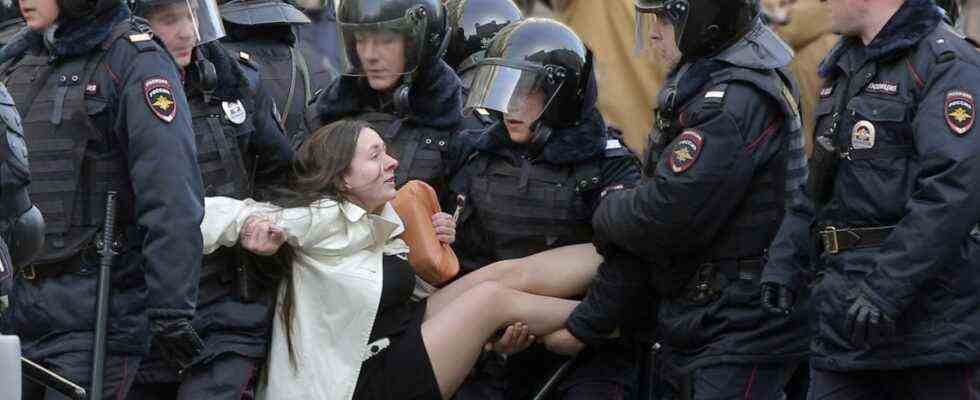“Russia will be free,” chanted hundreds of demonstrators in downtown Moscow. And demand: “Putin’s gang in court!” But when someone is brought to justice in Russia, it’s usually the protesters. At rallies, the police don’t even bother to identify the spokesmen. She randomly pulls protesters out of the crowd. The crimes they are then charged with are often exaggerated in court or are fabricated anyway. A conviction, however, is as certain as amen in church.
In his documentary, the filmmaker Stéphane Bentura vividly describes the mechanisms of this unequal confrontation between the state power and an oppositional part of the population Russia – Gagged Freedom based on good protagonists and meaningful images. His film immediately follows the documentary in Arte’s linear programme Putin – The Return of the Russian Bear. The phrase “Russia will be free” can already be heard there, albeit not literally. In this case, however, it is President Vladimir Putin who keeps promising freedom for Russia. Which he equates with state sovereignty, both internally and externally.
Publicly addressing corruption is a serious offense in Russia.
Putin is not concerned with the freedom of the individual. In his logic, those demonstrating against his policies plead for bondage, for submission to the West, especially the US, for the surrender of everything that constitutes Russia and on which it bases its identity. In this thought construct, individualism damages the collective. Hence the severity with which the state apparatus acts against dissidents. Because with propaganda alone, the constant reference to Russia’s size and importance, to power and prosperity, the system has long been unable to unite everyone behind it. According to the filmmaker Bentura, this story hardly catches on, especially among younger people. According to estimates, around two million Russians have left the country since 2008, especially those with higher qualifications who still have life ahead of them in order to build a livelihood abroad.
Others simply fled the repression. Just like 35-year-old Dimitri, who has no family name and who now lives in Lithuania. Without ever having committed a violent crime, he was sentenced to a total of 14 years in prison for trifles, during which he was tortured. The economist Sergei Gurijew now lives in Paris. His crime: He had spoken publicly about corruption in Russia. “It’s better for Putin if a person who understands what’s going wrong goes into exile,” says Guriyev. The fewer people subverting the authoritarian narrative of Russian glory, the more conducive it is to the internal stability Putin desires.
The poison of authority may, in the long run, corrode the system itself.
Vladimir Yegorov also fled by swimming across a lake and got to Lithuania that way. There he lives in a reception center and waits for a decision to be made on his asylum application. Yegorov has escaped the threat of arrest, he should be charged with extremism. He had to leave his wife and children behind. He is accused of filming a real satire in his village by simply filming the dilapidated condition of the streets, buildings and the power grid and how the residents below the subsistence level cope with their everyday lives. Yegorov comments on this like: “You don’t need NATO to destroy Russia.”
On the other hand, Pyotr Tolstoy readily shares what he thinks of people like Yegorov or the demonstrators in the capital – he calls them lunatics. Tolstoy is deputy chairman of the Russian parliament, the Duma, and a partisan of Putin – but a former friend of the filmmaker Stéphane Bentura, who therefore still has access to him.
The film is called in the original French Le poison autoritaire, the authoritarian poison. An ambiguous title, which on the one hand indicates that opponents of the regime are repeatedly poisoned, most recently the figurehead of many opposition figures, Alexej Navalny. But he also indicates the possibility that a system poisons itself in the long term.
Putin’s foreign policy appears as a logical reaction to Western action.
In sum is Russia – Gagged Freedom a complex and always clear film about the inner constitution of Russian society, related to their relationship to the state power. Bentura is always aware that he can only focus on developments, problems and scandals.
This humility works Putin – The Return of the Russian Bear away. The filmmaker Frédéric Tonolli takes a look at Putin’s foreign policy – largely from his perspective. And makes it clear that he, Tonolli, has understood what “the West” doesn’t want to understand: how much the eastward expansion of NATO hurts and endangers Russia and how strategically clever Putin is re-establishing his country as a great power – as a logical reaction to Western action. Largely uncommented is how indifferent Putin is to the right of self-determination of countries like Georgia and Ukraine, Syria and Libya. The film rarely goes beyond stereotypes – this starts with the title – and just as little about the obvious. So there are no enlightening thoughts and explanations during these 60 minutes, only a solid summary of the events.
Putin – The Return of the Russian BearArte, February 15, 2022, 10 p.m.
Russia – Gagged FreedomArte, February 15, 2022, 11 p.m.

